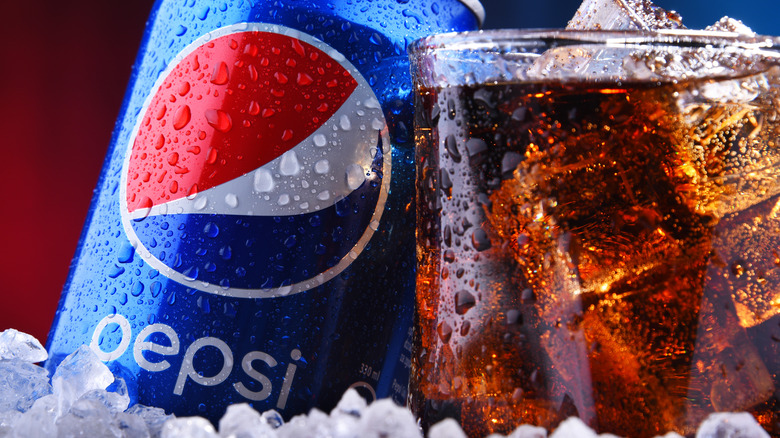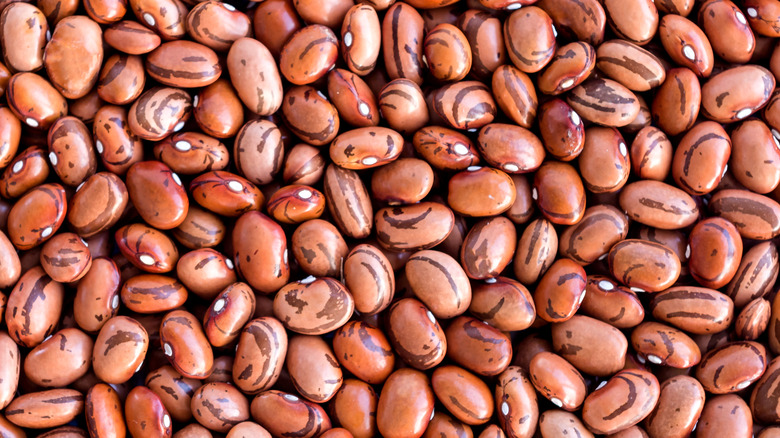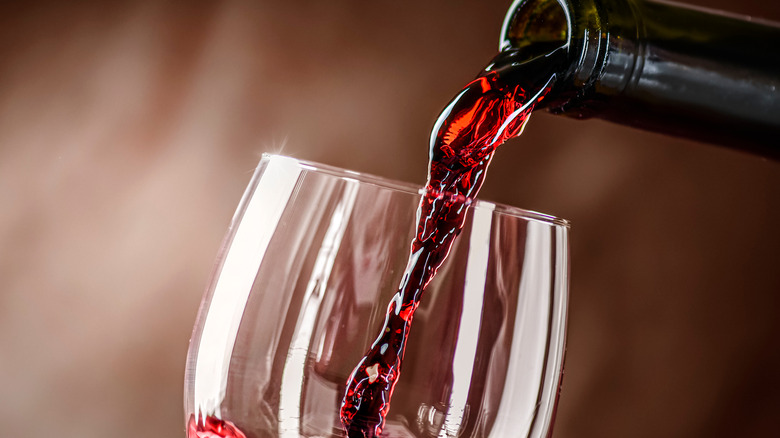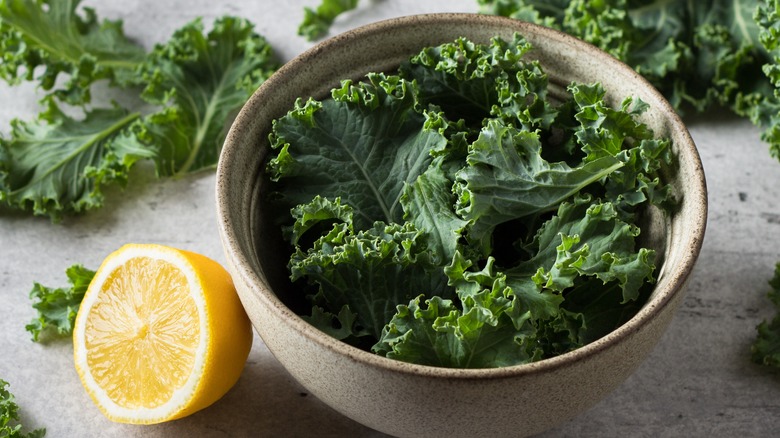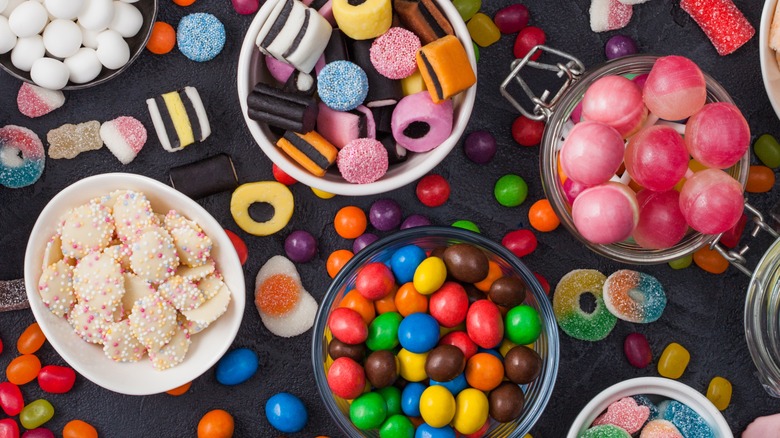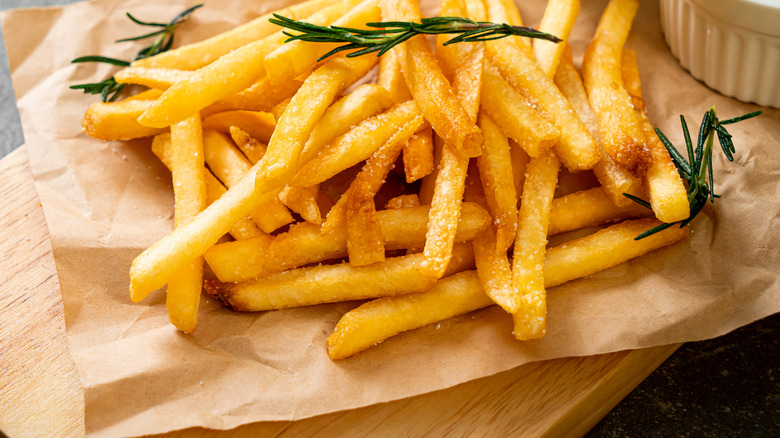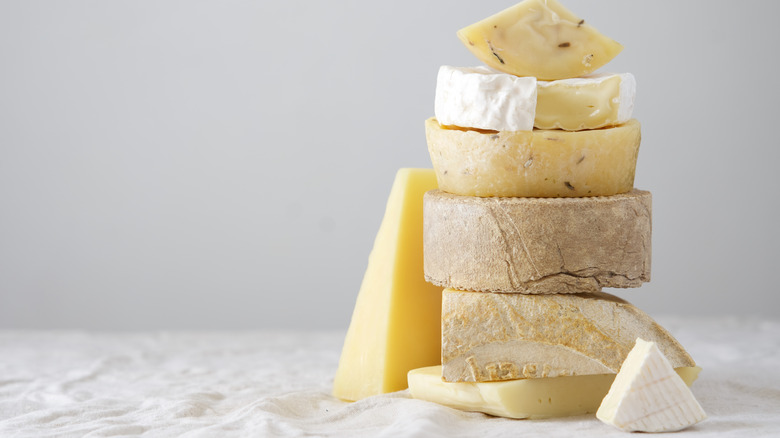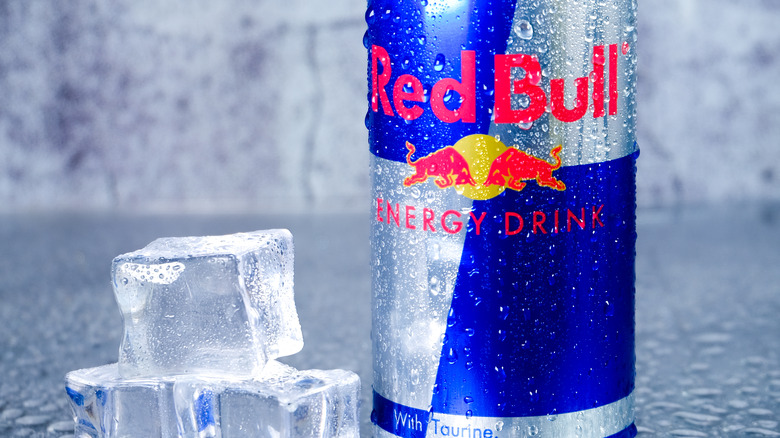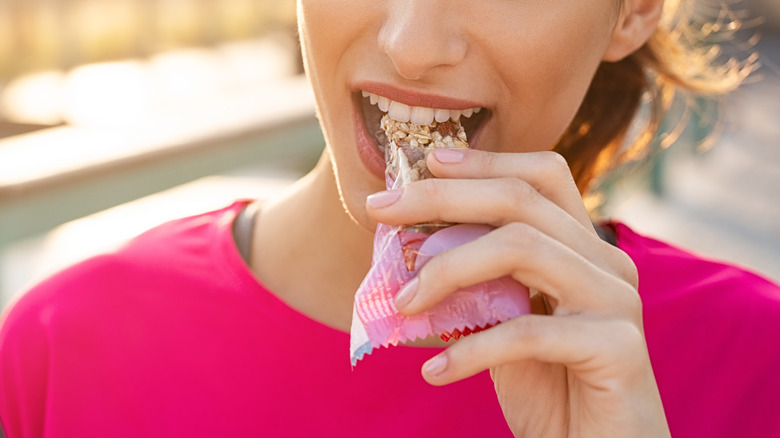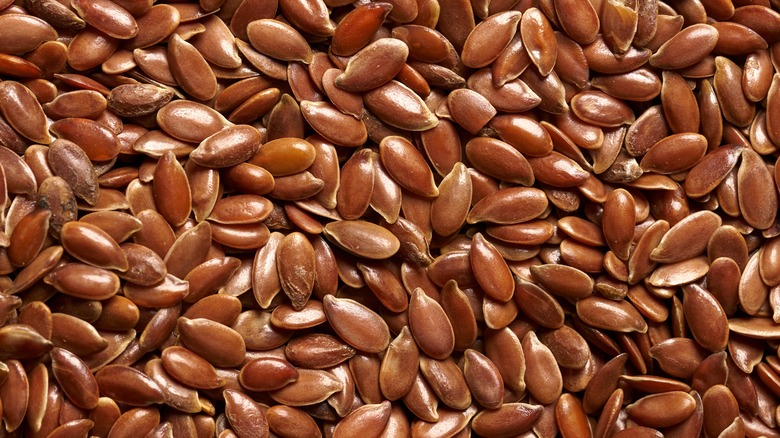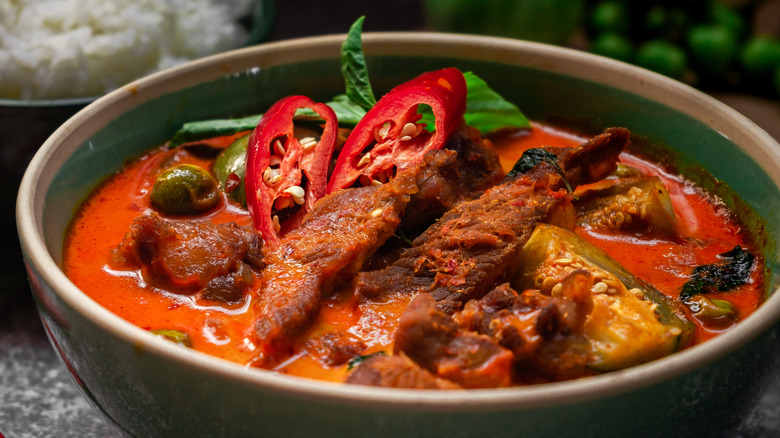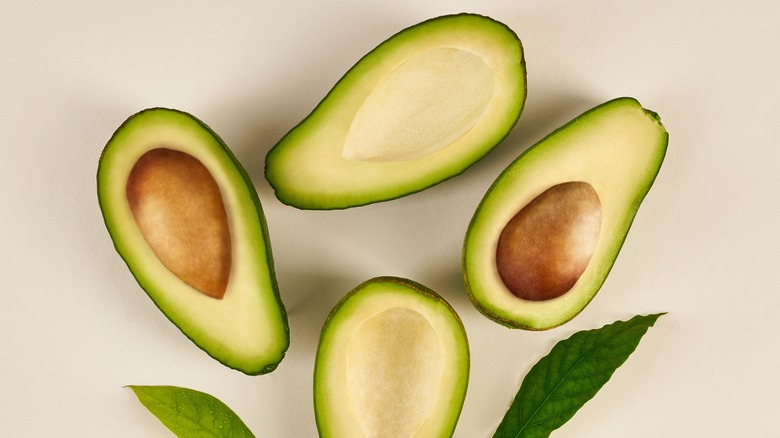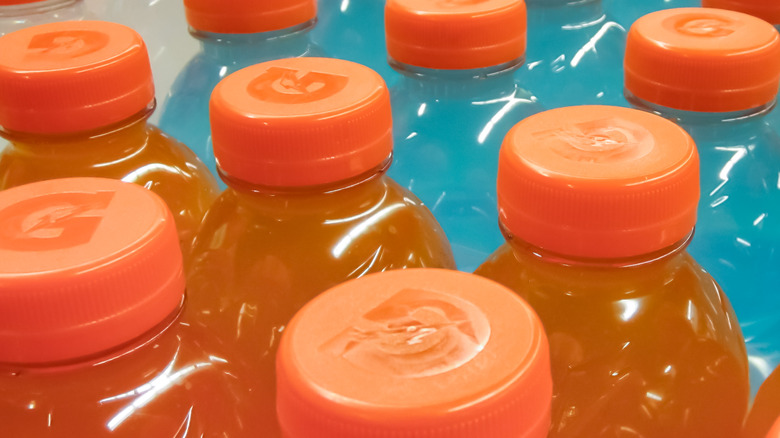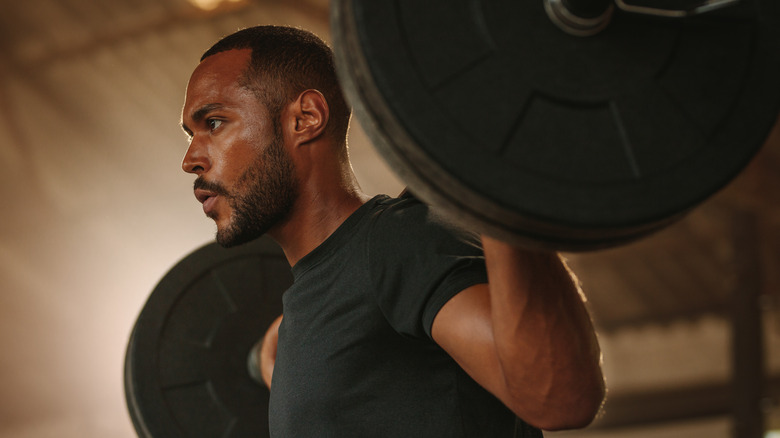Foods You Should Never Eat Before A Workout
When it comes to fitness, there's a general understanding that the more consistently you train, the more results you'll see. But staying fit isn't just about how much time you're putting in at the gym.
The truth is, the key to effective workouts lies in what you eat before you even set foot on a treadmill or into a weights room. "Fueling properly before a workout can make or break your session," states registered dietitian nutritionist Megan Casper (per Aaptiv). Indeed, the right balance of nutrients can turbocharge your exercise sessions and have you performing like never before.
But by that same token, certain foods definitely won't help you if you're looking to make your workout the best it can be –- and some foods might even surprise you with how unhelpful they are for your pre-workout routine. While foods packed with healthy fats, protein, and fiber might be a great choice normally, they may not be the best choice before exercise, and there are certain foods that you might want to skip entirely. In this article, we'll dig into why this is the case — and show you the foods you should keep in the fridge before lacing up your sneakers.
Carbonated drinks can cause discomfort
We can understand the logic behind cracking open a can of cold Coke before a workout. After all, caffeine and sugar should give you some much-needed energy for that exercise session, right? Well, we'd think twice about consuming carbonated drinks before a workout, as they might not be as useful as you think.
"It's well known that fizzy drinks are nutritionally void and more often than not laden with sugar, so it shouldn't be too surprising that they're a poor choice for your pre-workout drink," says David Wiener, Freeletics training and nutrition specialist, to Cosmopolitan. Although the sugar might pick you up, it will also cause a feeling of bloating, added to by the carbonation of the drink. These two things, according to Wiener, "lead not only to a sugar crash but also cause stomach cramps and nausea during your workout."
And that's not the only place where carbonated drinks could cause problems. Drinking carbonated beverages before a workout could lead to kidney damage after your workout, according to research published in the American Journal of Physiology. The study found that people who drank high-sugar, caffeinated carbonated drinks before a workout had certain indications of kidney injury than those who drank just water didn't.
For some people, beans are a bad choice
Okay, we understand why you might have raised your eyebrows at this one. With beans being famed for giving sustained energy and basically being one of the healthiest foods you can eat, surely they're good before a workout. But for some people, it's not the case, due to them lacking a certain enzyme.
"Alpha-galactosidase [...] is needed to break down beans and cruciferous vegetables," explains "Rebuild" author and functional medicine specialist Robert Zembroski to Eat This, Not That. For people who don't have alpha-galactosidase, when the beans are digested in the gut, increased gas is created. This, says Zembroski, results in "bloating, gas, and pain—a situation you don't want at the gym."
However, it's not all bad news. Zembroski does state that with their high-quality combo of protein and carbs, beans are excellent fuel overall, and supplements are available for those missing the enzyme that can aid digestion. And once your workout's done? Reaching for those beans is a great idea, with their awesome nutritional profile helping to rebuild muscle and keep us stocked up on nutrients, according to registered dietitian Stevie Smith (via Bicycling).
Alcohol can impair your focus
Avoiding alcohol before working out might seem like a no-brainer, but for anyone who's ever felt a little stronger or ambitious after a few drinks, it might not seem that bad of an idea.
But as it turns out, drinking before a workout is a pretty bad move, with the first reason being that your coordination and mindset can be impaired. "Here's the thing: You're going to get to the gym and probably be so unfocused that your workout is going to feel crappy and you won't reap the benefits," warns fitness coach and Courageously Confident founder Stephanie Schultz (via Healthline). And these problems won't just exist immediately after drinking, with One Medical provider Michael Richardson stating that a heavy night could lead to co-ordination problems and potential injury the next day.
There's also the dehydrative effect that alcohol causes, which can result in less than optimal workouts or even injury. "It is important to make sure you are well hydrated before you exercise to prevent muscle cramping or passing out" even if you feel as though you're not impaired, says Richardson. If you do happen to have a drink or two before you're planning on working out, waiting until the effects pass, staying hydrated, eating well, and not working out too hard are all advisable.
While kale is healthy, its fiber content can be problematic
It's hard to think of many foods that are as universally praised as kale for their nutritional benefits. But when it comes to working out, kale may not be your best friend.
"Sure, kale is the ultimate health food, but is it really going to help you crush that workout? No way," proclaims "Self-Care in the City" author and health coach Michelle Cady (via Eat This, Not That). This is down to the fiber in kale and other cruciferous vegetables taking longer and more effort for you to break down. While this fiber is normally manna from heaven for your body, "since your digestion mostly stalls or shuts down while you're engaged in a hard workout, eating cruciferous vegetables can lead to bloating, gas, and discomfort in your digestive tract," Cady states.
Instead of high-fiber foods like kale, try opting for choices that will take less effort for your body to digest but will still provide necessary carbs, like bananas, crackers, or toast, advises the American Council on Exercise. And after your workout, the fiber that kale provides will come in handy due to its potential benefits for heart health and diabetes risk reduction, alongside other positives.
Eating candy will put your blood sugar on a rollercoaster
So you've got a killer workout planned, but you're tired. What do you do? We can see why candy, with its sugary goodness providing quick energy, might be the logical choice.
But candy and other sugary carbohydrates pre-workout can impact you pretty negatively, says certified personal trainer Nate Miyaki (per Men's Journal). Miyaki states that eating solely high-glycemic carbohydrates before a workout "can trigger rebound hypoglycemia in some [blood sugar spikes and crashes] which can lead to fatigue, lightheadedness/dizziness, energy crashes, and poor performance." Not what you want from your gym session. According to Healthline, the added refined sugars in candy are also pretty devoid of nutrients, which means you're consuming empty calories that won't help your diet in the long run.
Instead, if you're thinking about what to eat a few hours before, carbs like whole-grain pasta, whole-wheat toast, brown rice, or low-fat yogurt can help supply sustained energy while remaining easily digestible (per the American Heart Association). And if you need a quick boost before a workout, a piece of fruit like a banana or apple can be a great choice.
Fried food is a bad choice before exercise
On the surface, certain fried foods might seem like a logical choice before a workout. Fried foods are often protein-based, after all. As consuming protein before a workout leads to a higher level of muscle protein synthesis and helps build strength and endurance (per Medical News Today), that piece of fried chicken might start to look like a not-so-weird choice.
But most nutrition experts would say the exact opposite. Before a workout, "the worst thing to eat would be any fried food," says registered dietitian and "The Sports Nutrition Playbook" author Amy Goodson (via Eat This, Not That). Due to their high fat content, fried foods can sap your energy and alertness, and are "likely to leave you feeling heavy and weighed down before a workout."
And that's all before you consider the fact that consuming fried food regularly can lead to some seriously profound health problems, like a heightened risk of heart disease, stroke, and all-cause mortality, as a study published in Heart shows. Instead of getting your protein fix from fried foods, Goodson recommends consuming a combo of lean protein and complex carbs a few hours before a workout and keeping your fat intake lower, to avoid your having stomach do too much work (per Eat This, Not That).
The lactose in cheese can be hard on your gut
Ah, cheese. The most delicious of foods, and the hardest to time when you eat. But while the jury's still out on whether eating cheese before bedtime is going to cause you nightmares (per BBC Future), one time you probably shouldn't be eating it is before a workout.
Cheese, along with other dairy products, "contain protein and fat," says certified dietitian nutritionist Megan Casper (via Aaptiv). While protein in particular is essential to consume around workouts to help muscle recovery and growth, both protein and fat "take longer to digest and can lead to indigestion and bloating if you work out soon after eating," Casper states. And the thing is, even if you don't have a diagnosed lactose intolerance, you may still have problems with digesting dairy that may rear their head during a workout. Over a third of Americans have some level of issues with lactose absorption, per a study published in The Lancet Gastroenterology and Hepatology.
If cheese and other dairy products have never been an issue for you, however, "it's perfectly fine to have some one to two hours before a workout," says registered dietitian Natalie Rizzo (via Aaptiv). Certain cheese choices, like non-fat cottage cheese, can also be a good way to get your cheese fix before a workout, as a top-choice pre-workout snack (per the American Council on Exercise).
The caffeine in energy drinks can limit your workout
We don't know about you, but energy drinks just seem designed for drinking before a workout. Endless adverts featuring athletes chugging an energy drink and then zooming off down the track can be very convincing.
But it's sensible to be wary about consuming energy drinks before working out, precisely due to their caffeine content. Although the caffeine in energy drinks can help to perk you up before exercise, registered dietitian Christine Palumbo says that ingesting too much of it can lead to headaches and dehydration, which will hinder your workout big-time (per Eat This).
Consuming caffeine can also cause problems elsewhere thanks to its potential laxative effect, according to Verywell Fit. When you're out exercising, "you make your whole GI tract move, from mouth to rectum," says dietitian Dee Rollins. This motion, combined with the potential laxative impact that caffeine has, can leave you with a big issue. It's also worth bearing in mind that some energy drinks contain additional stimulating substances like guarana, boosting their caffeine content way beyond what you'd drink with a coffee, particularly if you're slamming them back. "People may be in more trouble than they realize," warns Rollins.
Protein bars can contain hidden ingredients
Look, stick with us here. We understand why it might not make sense that eating protein bars, food that seems to exist with the sole purpose of fueling a workout, may not be a good choice pre-exercise. But it's all in the ingredients, friends.
Although these bars do supply a good amount of essential protein, "don't be fooled by crafty marketing," warns "Turn Up The Heat: Unlock the Fat-Burning Power of Your Metabolism" author Philip Goglia (via Women's Health Magazine). Instead, it's the sugar content you have to worry about. "Unless what you're eating tastes like salmon, chicken, or steak instead of cookies or chocolate, chances are it's loaded with sugar and fairy dusting of some kind," Goglia says.
And it looks like Goglia has a point. Despite being aimed at the health-conscious, these carb-loaded bars can often contain more sugar than a doughnut, as a report from Food Navigator USA states. Some protein bars are also alarmingly high in saturated fats as well, with certain brands clocking in at almost 10 grams of saturated fat per serving, more than double the amount in a classic Krispy Kreme treat. Given the health impacts of consuming too many saturated fats as well as the fact that eating high-fat foods before working out can impede your exercise (per Medical News Today), it might pay to skip this snack.
Flaxseeds are best eaten after a workout
Flaxseeds are normally a healthy eater's dream food. Packed with fiber, valuable omega-3 fatty acids, lignans, and other compounds with antioxidant effects, flaxseeds are a powerful ally in the pursuit of maintaining heart health, lower cholesterol, and digestive health (per the Mayo Clinic).
But on workout days, that fiber that's so helpful other times becomes a little more problematic. Los Angeles-based clinical nutritionist Stella Metsovas says that the fiber in flaxseeds can end up leaving you feeling gassy and bloated, reducing your ability to complete your exercise to its fullest potential (via Shape). Instead, you should "limit the amount of fiber you take in 2 hours before and after exercising. In addition to flaxseeds, stay away from fiber supplements, bran, and high-fiber breads," as Metsovas advises. She also suggests eating a combo of carbs and protein before you hit the gym.
After your workout, though, flaxseeds could be your best friend. As personal trainer and Jemma's Health Hub founder Jemma Thomas says, eating fiber after a workout will help your gut stay in good functioning order (per GoodtoKnow).
Spicy foods can cause your stomach grief when exercising
You might enjoy the flavor bomb that a super-spicy curry or burrito provides, but we're willing to bet that you won't enjoy it as much if you're eating your spicy food before a workout.
Spicy foods are a less-than-ideal choice before a workout because of a few effects they might have on your body, says David Wiener, Freeletics training and nutrition specialist (via Cosmopolitan). "Firstly, spicy food can result in indigestion or heartburn which can leave you in pain and having to abandon a workout," Wiener states. This is due to the presence of capsaicin and its stimulating effects on your gastric system, as one study published in Alimentary Pharmacology & Therapeutics shows.
Eating spicy foods before a workout can also lead to more cramping in your stomach, Wiener warns, "which again could force you to halt a workout, or effect the amount of effort you're able to put in." Instead, give your belly a break by eating more bland foods before you exercise. And once you're done, it might be worth just holding off a while before you douse your food in hot sauce. According to Carillon Miami Beach's fitness manager Michelle Neverusky, hitting your body with super-spicy food in its already weakened state won't help it out much, and opting for easier-to-digest foods higher in carbs and protein is your best post-workout option (per Eat This).
The fat content of avocados might cause some trouble
Look at any fitness enthusiast's shopping basket, and you can bet that avocados show up. Nutritionally dense, rich in minerals and vitamins, and abundant in heart-healthy monounsaturated fats (per BBC Good Food), it's little wonder they're a staple of balanced plates worldwide. But while those monounsaturated fats might be good for you, eating too much of them before a workout could cause issues. When you eat fats, they increase the levels of blood in and around your stomach tissue to support digestion (via Shape). When this happens, your likelihood of stomach cramps gets higher, inhibiting your workout.
It's important to include these heart-healthy fats in your diet, though, at other points in the day. "Fats are very important and should be consumed at other intervals in the day, just try to limit your fat intake two hours before and after exercise," says Los Angeles-based clinical nutritionist Stella Metsovas. Eating avocados after exercise can aid with your recovery, with monounsaturated fats helping to support muscle and joint repair and B vitamins helping your carb and protein metabolism, explains registered dietitian and sports nutritionist Cynthia Sass (via GQ).
Contrary to popular belief, sports drinks may not be the best option
Yep. We went there. Now, we know that not everyone will agree with us in saying that sports drinks are off the menu before a workout, but there's a solid claim behind avoiding these proficiently-marketed beverages in favor of something else.
While it's true that sports drinks are packed with electrolytes and essential vitamins that may help boost your workout and keep you hydrated, they're also packed with sugar, registered dietitian and Mom to Mom Nutrition founder Katie Serbinski stresses via Women's Health Magazine. This sugar can pass through you before you know it, "causing you to crash later on," Serbinski says. And some sports drinks can contain up to nineteen teaspoons of sugar for a 32-ounce serving, according to UI Children's Hospital. Yikes.
In fact, sports drinks may not even be that better for hydration than regular old water for people who aren't practicing sports at an athletic level. A study published in the Journal of the International Society of Sports Nutrition found little difference in hydrating effects between water, sports drinks, and coconut water, for people conducting a 60-minute workout. That said, if you're worried about your electrolyte balance, registered dietitian Nancy Teeter suggests a lower-sodium tomato juice (via Women's Health Magazine). High in potassium, low-sodium tomato juice can help keep your blood pressure healthy and maintain hydration.
So what should you eat before a workout?
We're well aware that it might seem like everything's off the menu before a workout, but pre-exercise nutrition is much simpler than we think.
The key is to consume smaller amounts of food that are higher in carbs and protein between 30 minutes and a few hours before your workout, according to registered dietitian Jessica Jones via SELF. The carbs will help boost your glucose levels, supporting the glycogen stores that leave your muscles when you work out. Meanwhile, the protein helps to rebuild muscle damage caused during exercise.
It's best to keep things simple. Jones suggests easy snacks like rice cakes with nut butter on top, granola bars, a serving of Greek yogurt with some berries and granola, or for something a little more substantial, salmon with brown rice and a side of vegetables. The most important thing to remember, though, is to listen to your body. Everybody's different when it comes to what works best for them before a workout, so experiment with different things and you'll soon find your perfect pre-workout snack!


